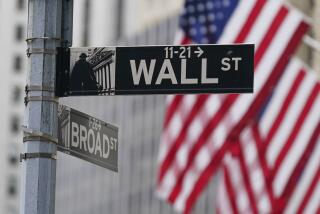Hong Kong Takes Second Look at China Boom : Economies: Inflation and a devalued yuan are seen as danger signs for the colony. Stock market shows uncertainty.
- Share via
HONG KONG — No business community has benefited more than this one from China’s tremendous economic growth, but lately, executives and investors here have been nervously watching to see if China’s overheated economy will burn them.
The rapidly rising rate of inflation--more than 16.7% in some cities--and a recent drop in the value of the Chinese currency have caused unease in the Hong Kong stock market. Many analysts also fear that Beijing’s long-anticipated crackdown on credit will slow the economic growth and hurt Hong Kong companies doing business in China.
“The big test that’s going on in China now is whether the government can pull enough levers, or the right levers, to bring about a soft landing in the Chinese economy,” Ian Perkins, chief economist of the Hong Kong General Chamber of Commerce, said recently. “And, given the strong economic links between Hong Kong and China, Hong Kong cannot hope to escape unscathed from any mainland (economic) downturn.”
Responding to such fears, the Hong Kong stock market’s Hang Seng index last Monday fell 197.17 points, to close at 7,003.58. On Friday, the index closed at 7014.08, down 5.8% from its May 27 peak of 7,447.24.
“The fact that the China situation could deteriorate . . . I would argue that we’re more than likely to see a market that could potentially go a bit lower in the next two to three months,” said James Osborn, director of sales for Baring Securities (H.K.) Ltd.
Hong Kong companies with operations in China and earnings affected by the value of China’s currency got a jolt earlier this month, when the government lifted exchange rate controls on the official currency market and the yuan (also known as the renminbi) promptly fell 25% against the U.S. dollar.
Fortunately, most Hong Kong companies doing business in China export most of what they make there and are not expected to be hurt in the short term by the yuan’s decline.
The major risk to investors, according to some analysts, lies in holding shares of Hong Kong companies that sell consumer goods to China.
“Investors have been advised to sell their shares of (garment maker) Goldlion Holdings stock, because this company has as much as 70% of its sales in China,” said Elizabeth Tran, chief investment officer for Prudential Asia Capital Ltd.
A vast potential consumer market exists in China, but investors cannot expect to reap substantial benefits anytime soon, said Andrew Hall, head of Hong Kong research for SBCI Finance Asia Ltd. “Investors who had expected to cash in on that in a few months may find that a few months becomes a few years instead.”
Hong Kong investors in projects in China may also be affected by the credit crunch Chinese authorities imposed to hold down inflation, analysts say.
“The main impact, in terms of China’s overheating economy, is going to be (rising) construction costs, which will cause problems for property developers,” said David Faulkner, a partner in Hong Kong property consultants Brooke Hillier Parker.
Companies listed on the Hong Kong stock exchange have invested in at least 801 Chinese development projects with a value of $66.8 billion, according to a May report by Credit Lyonnais Securities (Asia) Ltd. Some 58 public works projects involving Hong Kong investors are planned or underway in 15 provinces, the report said.
In the last few years, Hong Kong has benefited from Chinese investments in property here, but the flow of funds may dry up if the Chinese economy slows significantly.
“I think, in the short term at least, Hong Kong will see an acceleration of hard currency into (Hong Kong) as a safe haven,” said Peter Churchouse, principal at Morgan Stanley Asia Ltd. “But the (currency) devaluation will make Chinese investors bringing cash out of China for investment in Hong Kong think twice.”
Meanwhile, however, Hong Kong companies continue to invest in China.
“No one is yet saying that the long-term story of China is being dented by what’s going on now,” said Andrew Riddick, an analyst for Credit Lyonnais Securities in Hong Kong.
According to Riddick: “Companies here are still very happy to take up stakes in China in projects that they like.”
China’s Booming Economy China has experienced tremendous economic growth in recent years.
Gross National Product 1985: 22.9% 1986: 13.3% 1987: 16.6% 1988: 24.0% 1989: 13.5% 1990: 11.1% 1991: 11.7% 1992: 21.1% Infltion Rate Increases in the cost-of-living index have sparked fears of inflation.
Source: Morgan Stanley & Co. Inc., Researched by ADAM S. BAUMAN / Los Angeles Times
More to Read
Inside the business of entertainment
The Wide Shot brings you news, analysis and insights on everything from streaming wars to production — and what it all means for the future.
You may occasionally receive promotional content from the Los Angeles Times.










